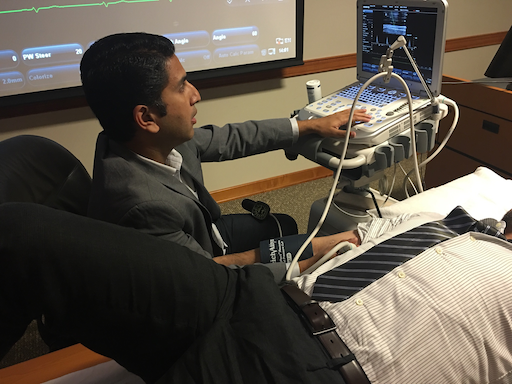On Friday, researchers from Emory Clinical Cardiovascular Research Institute demonstrated a test for how much blood vessels adjust to changes in blood flow. This test is known as “flow-mediated dilation” or FMD. A blood pressure measurement cuff is tightened on the arm for five minutes, restricting blood flow.
When the cuff is released, blood flow increases, but how much the arm’s main artery expands depends on the endothelium – the lining of the artery — and its ability to respond to nitric oxide, which is induced by the increased flow. Researchers monitor the artery’s expansion by ultrasound.
ECCRI co-director Arshed Quyyumi and his colleagues at Emory have extensive experience using the FMD test. Impaired endothelial function is an early stage in the process of atherosclerosis.
The FMD test is relatively non-invasive, in that no catheter probe is necessary. However, practitioners need practice and careful study design to ensure accuracy, ECCRI investigator Salman Sher explained. Posture, time of day and whether the patient has eaten can all affect the results.
Lab Land asked Sher (seated in the photo) whether the effect was similar to the common experience of sleeping on an arm and having it turn numb, followed by “pins and needles” when the pressure is relieved. This feeling actually comes from nerve compression. Read more





